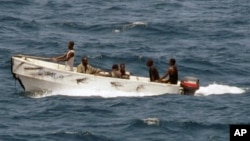MOMBASA —
Attacks by Somali pirates have fallen dramatically in 2012, a development chalked up to multi-national naval efforts, increased security measures by ships, and developments on land in Somalia.
In the Regional Marine Rescue Coordination Centre, overlooking the port in Mombasa, Kenya, officers watch monitors displaying the location of all the ships along the Horn of Africa.
Vessels continuously broadcast signals to the center, but if hijacked by pirates, the signal is cut and they disappear from the screen.
These days, fewer and fewer ships are disappearing. Last year, the European Union Naval Force Somalia, or EU NAVFOR, recorded 176 pirate attacks. In 2012, this number fell to 34 attempted hijackings.
"This year in our region no vessel has been hijacked," said Jonathan Omondi, an operations officer at the center. "The land-based piracy initiatives have made a big contribution, specifically the effect of African Union forces that are deployed on land. Piracy is a land-based problem. Piracy at sea is just a symptom of the problem on land."
While many attribute the decline in piracy to the recent political and military advances made by pro-government forces in Somalia, others emphasize the coordinated efforts of NATO and EU naval forces patrolling the Somali coast.
Peter McGhie, the chief officer in Mombasa for the United Nations Support Office for AMISOM, says the use of private security on ships has also deterred the pirates.
"We’re putting vessel protection details on all of our vessels and the end result is that the graph has gone right down," he said.
While pirate attacks have been reduced, grapples over jurisdiction linger. Not far from the port in Mombasa, many accused pirates remain in custody at the Shimo la Tewa Prison.
Jay Bahadur, author of the book "The Pirates of Somalia," says the legal situation is complicated. Two treaties - the U.N. Convention on the Law of the Sea and the Convention for Suppression of Unlawful Acts Against Maritime Navigation - outline maritime law.
"In essence it makes piracy a crime of international jurisdiction. If it’s outside of territorial waters, 12 nautical miles, it means anyone who captures a group of pirates has jurisdiction over them," he said.
Last week, a court in the U.S. state of Virginia denied a request of suspected Somali pirates to change the location of their trial. They are accused of killing four Americans while pirating a yacht in 2011.
Bahadur says this case in unusual. Despite having legal claim, most Western countries avoid extradition of captured pirates.
"Up until a year-and-a-half ago, Kenya was the main dumping ground for pirates, but it’s really stretching the international conventions to allow that," he said.
In 2010, Kenya, its prisons overcrowded, ended an agreement with the EU to try suspected Somali pirates.
Since then the Seychelles islands have headed the prosecution efforts. This week the country sent 17 convicted Somali pirates to serve their sentences in jails in Somalia's Puntland region and the breakaway republic of Somaliland.




